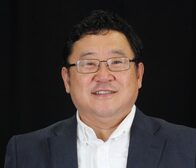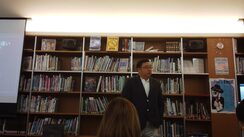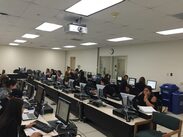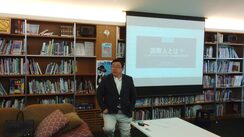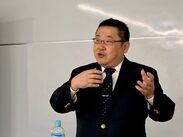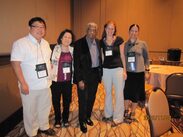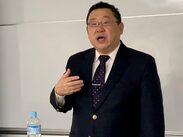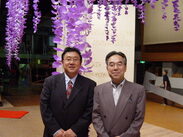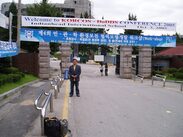MABII PRESENTER PROFILE
Short Bio
Yujiro Shimogori is a balanced, bicultural individual, having lived, studied, and worked in both Japan and the United States for an equal number of years. In 2017, after teaching and conducting research in Southern California for eight years, Shimogori returned to Tokyo to establish his life-long mission, SevenSees educational center. The main agenda of SevenSees is to foster cross-cultural relationships. Shimogori is also a former elementary school teacher in four bilingual programs in Los Angeles, Numazu, Tokyo. He received his Ph.D. in Education from San Diego State University and a Ed.M in Constructive-developmental psychology from Harvard University. Concurrently Shimogori instructs college students at Tokyo University of Foreign Studies in the Global Education program.
Educational Background
Ph.D. Education, San Diego State University (SDSU) & Claremont Graduate University (CGU)
Focus: Bilingual Education
Ed.M. Education, Harvard University
Program concentration: Human Development and Psychology
B.A. Psychology, Pepperdine University
High School Diploma, American School in Japan
First to eighth grade, Nishimachi International School
Bilingual program in English and Japanese
Higher Education Teaching Background
Tokyo University of Foreign Studies
Part-Time Lecturer, 2017 - Present
- Interactive English: Production
- Public Speaking for Interpreters/Translators
- Debate
- Academic English: Skilled-Based
Temple University
Lecturer, 2017 - Present
- Language Course Design and Assessment
- Teaching Young Learners
- Issues, Ideas, and Opinions
- Constructivist Pedagogy
Sophia University
Part-Time Lecturer, 2018 - 2021
- Academic Communications 1 (Advanced)
California State University San Marcos
Lecturer, 2013 - 2016
- Educational Psychology: A Psychological Perspective
- Multicultural Perspectives in Psychology
- Introduction to Human Development Across the Lifespan
- Applied Research in Human Development
Argosy University
Adjunct Faculty, 2013-2014
- Research Methods
- Ethics in Psychology
- Sociology in a Global Perspective
K to 12 Teaching Background
La Mesa Middle School, La Mesa, CA, 2010
Volunteer, Taught sixth and seventh grade students in language arts (ELL) and math
Koka Gakuen Elementary School, Tokyo, JAPAN, 2005-2009
Director of English Program and English Teacher, Developed the English curriculum; taught first, third to sixth grade
Nishimachi International School, Tokyo, JAPAN, 2001-2004
Japanese Language Arts Teacher & Third Grade Homeroom Teacher, Taught third, sixth, seventh, and eighth grade
El Marino Language School, Culver City, CA, 1997-2001
Public School Elementary Homeroom Teacher, Taught second, third and fourth grade
Katoh Gakuen Elementary School, Numazu, JAPAN, 1996-1997
Substitute Teacher, Taught fourth and fifth grade
Publications
Paik, S., Ganley, D., Luschei, T., Kula, S., Witenstein, M., Shimogori, Y., & Truong, K. (2015). Intercultural exchange among global educators: The case of the teaching excellence and achievement study abroad program. International Journal of Intercultural Relations, 49,100-113.
Shimogori, Y. (2013). Cross-sectional, quantitative study on the Impact of Biculturalism on Self-Efficacy and Cognitive-Flexibility of Japanese Adults.
(Doctoral Dissertation). San Diego, California: Montezuma Publishing.
Pang, V.O., Stein, R., Gomez, M., Matas, A., & Shimogori, Y. (2011). Cultural competencies: Essential elements of caring-centered multicultural education. Action in Teacher Education, 33(5-6), 560-574.
Shimogori, Y. (2011). Exploring the relationship between NAFTA, US policies, and the influx of undocumented immigrants. International Journal of Humanities and Social Science, 1(15), 146-152.
Shimogori, Y. (2011). A hypothetical examination of meaningful and meaningless learning in the minds of native English speakers and English learners. Voices of Claremont Graduate University Student Research Journal Online, Vol. 1, 246-257.
Pang, V.O., Shimogori, Y., Stein, R., Garcia, F., Gomez, M., & Matas, A. (2011).Chapter: “Multicultural Education: An Analysis from the 1970s to thePresent.” In S. Totten and J. Pedersen (Eds.), Educating About Social Issues in the 20th and 21st Centuries: A Critical Annotated Bibliography (pp. 321-350). Charlotte, North Carolina: Information Age Publishing.
Shimogori, Y., & Chaplin, M. (2011).Review of literature for department of policy studies in language and cross cultural education. Online.
Shimogori, Y. (2010). Realization of a dual language society in 2030: Evolution of bicultural education through the eyes of the Ochoa paradigm. Real Worlds Journal, winter issue, 4-10..
Shimogori, Y. (2007). Zone of proximal development-English pedagogy (in Japanese). The Japan Association for the Study of Teaching English to Children.
Presentations
Shimogori, Y. (March 2022). Neoterism: Exploring bicultural identity transformation. Harvard University Graduate School of Education - Alumni of Color Conference (Online)
Shimogori, Y. (December, 2019). Positive English: The Best Approach to English Education. SevenSees, Fuchu, Tokyo (Japanese)
Shimogori, Y. (August, 2018). Emergence of global awareness through the conversion of two cultural identities. Annual Conference of The Society for Intercultural Education, Training, and Research, Tokyo
Shimogori, Y. (July, 2018). Why do you have issues with English? How to become fluent. SevenSees, Fuchu, Tokyo (Japanese)
Shimogori, Y. (June, 2016). Defining global citizen for Japanese and dual-nationality students attending International school. Nishimachi International School, Tokyo
Shimogori, Y., & Crosthwaite, G. (December, 2015). Culturally Relevant Pedagogy and English Learners. California Education Research Association Annual Conference, Anaheim.
Shimogori, Y. (June, 2014). Exploring the elements of Japanese graduates of international schools: Language acquisition, dual cultural identity development, and transformation. The International Society for Language Studies, Akita, Japan (Accepted)
Shimogori, Y. (April, 2014). Super bilinguals: Preserving one’s ethnicity as an agent for self-evolution. Annual California Association for Bilingual Education Conference, Anaheim (Accepted)
Pang, V.O., Gay, G., Alvarado, J.L., Larke, P.J., Park, C.D., & Goodwin, A.L., & Shimogori, Y. (chair) (2013). The folklore of the achievement gap: The mythology of achievement data. Annual American Educational Research Association Conference, San Francisco
Shimogori, Y. (2011). A hypothetical examination of meaningful and meaningless learning in the minds of native English speakers and English learners. Annual CGU Student Research Conference and Art Exhibition, Claremont
Shimogori, Y. (2011). Homogenizing the world and losing one’s ethnic identity. Annual California Association for Bilingual Education Conference, Long Beach
Shimogori, Y. (2010). Understanding the process and development of ethnic identity: Empowering children, youth, and … you! Annual National Association for Multicultural Education Conference, Las Vegas
Shimogori, Y. (2010). No gain without the brain. Los Angeles Regional California Teachers of English to Speakers of Other Languages Conference, Fullerton
Shimogori, Y. (2010). Capturing the diversity of a middle school community – A solitary dialogue. Annual Action Research Conference at the University of San Diego’s School of Leadership and Education Sciences, San Diego
Shimogori, Y. (2008). Am I Japanese or American? Second language acquisition as a means for becoming a peacemaker – A constructive-developmental perspective. Annual Conference of Peace as a Global Language, Tokyo, Japan
Shimogori, Y. (2008). Five minute activities – Stimulating multiple intelligence Annual Japan Private Schools Association Conference, Kobe, Japan
Shimogori, Y. (2007). Am I Japanese or American? Second language acquisition as a means for becoming a peacemaker – A constructive-developmental perspective. Annual conference of Peace as a Global Language, Kyoto, Japan
Shimogori, Y. (2006). Second language acquisition as a means to initiate transformation.Nishimachi International School Tomo no Kai (PTA), Tokyo, Japan
Shimogori, Y. (2006). Tips and risks for raising your child bilingually. New International School, Tokyo, Japan
Shimogori, Y. (2005). Second language acquisition as a means to initiate transformation. Indianhead International School, Seoul, Korea
Shimogori, Y. (2005). Tips and risks for raising your child bilingually. Aoba-Japan International School, Tokyo, Japan
Shimogori, Y. (2005). English acquisition for Japanese people will promote human development.Yokohama International School, Yokohama, Japan
Shimogori, Y. (2004). Developing a Japanese identity through acquiring English.Tokoha Gakuen, Shizuoka, Japan
Shimogori, Y. (2003). Second language acquisition as a means to initiate transformation. Nishimachi International School Tomo no Kai (PTA), Tokyo, Japan
Shimogori, Y. (2002). Second language acquisition as a means to initiate transformation. Nishimachi International School Tomo no Kai (PTA), Tokyo, Japan (English and Japanese)
Shimogori, Y. (2001). Second language acquisition as a means to initiate transformation. Japan Conference of International Schools, Tokyo, Japan
Guest Speaker
Shimogori, Y. (2020). 英語力の潜在する効用ー自由を得るための生き方ー自称日本版マーティン・ルーサーキングJr、からの私からの助言. 早稲田大学。2020年12月11日。
Shimogori, Y. (2020). Comparative Education: Japan and USA. International Comparative Education. University of San Diego. June 16, 2020.
